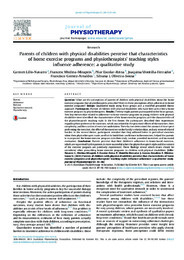Title:
Parents of children with physical disabilities perceive that characteristics of home exercise programs and physiotherapists’ teaching styles influence adherence: a qualitative study |
Authors:
Lillo-Navarro, Carmen 
Medina-Mirapeix, Francesc 
ESCOLAR-REINA, Mª PILAR 
MONTILLA-HERRADOR, JOAQUINA 
Gomez-Arnaldos, Francisco
Oliveira-Sousa, Silvana Loana  |
Editor:
Elsevier |
Department:
Departamentos de la UMH::Patología y Cirugía |
Issue Date:
2015-04 |
URI:
https://hdl.handle.net/11000/37939 |
Abstract:
Question: What are the perceptions of parents of children with physical disabilities about the home
exercise programs that physiotherapists prescribe? How do these perceptions affect adherence to home
exercise programs? Design: Qualitative study using focus groups and a modified grounded theory
approach. Participants: Parents of children with physical disabilities who have been prescribed a home
exercise program by physiotherapists. Results: Twenty-eight parents participated in the focus groups.
Two key themes that related to adherence to home exercise programs in young children with physical
disabilities were identified: the characteristics of the home exercise program; and the characteristics of
the physiotherapist’s teaching style. In the first theme, the participants described their experiences
regarding their preference for exercises, which was related to the perceived effects of the exercises, their
complexity, and the number of exercises undertaken. These factors determined the amount of time spent
performing the exercises, the effect of the exercises on the family’s relationships, and any sense of related
burden. In the second theme, participants revealed that they adhered better to prescribed exercises
when their physiotherapist made an effort to build their confidence in the exercises, helped the parents
to incorporate the home exercise program into their daily routine, provided incentives and increased
motivation. Conclusion: Parents perceive that their children’s adherence to home-based exercises,
which are supervised by the parents, is more successful when the physiotherapist’s style and the content
of the exercise program are positively experienced. These findings reveal which issues should be
considered when prescribing home exercise programs to children with physical disabilities.
|
Keywords/Subjects:
Parents
Adherence
Exercise
Qualitative research
Physiotherapy |
Knowledge area:
CDU: Ciencias aplicadas: Medicina |
Type of document:
info:eu-repo/semantics/article |
Access rights:
info:eu-repo/semantics/openAccess
Attribution-NonCommercial-NoDerivatives 4.0 Internacional |
DOI:
https://doi.org/10.1016/j.jphys.2015.02.014 |
Published in:
Journal of Physiotherapy. Volume 61, Issue 2, April 2015, Pages 81-86 |
Appears in Collections:
Artículos Patología y Cirugía
|

.png)
